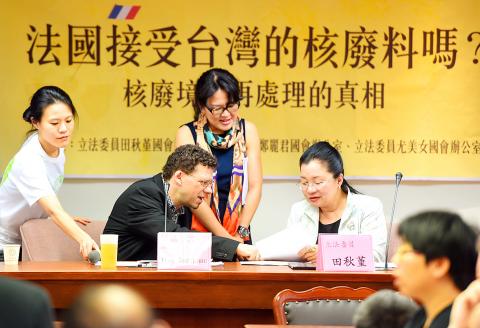The international community has stopped the practice of shipping nuclear waste overseas for reprocessing, and state-run Taiwan Power Co’s (Taipower) plan to do so is just delaying nuclear waste management, French nuclear safety expert Yves Marignac said yesterday.
Speaking at a news conference in Taipei, the director of French non-profit nuclear energy consultancy World Information Service on Energy (WISE-Paris) said that Taiwan’s spent fuel pools reaching capacity and Taipower’s plan to reprocess highly radioactive nuclear waste are two separate issues that should not be discussed in the same context.
Taipower in February issued an online call for bids to solicit overseas contractors to reprocess about 1,200 bundles of spent fuel rods from the Jinshan and Guoshan nuclear power plants in New Taipei City, for which the company has requested a budget of NT$11.25 billion (US$362.9 million).

Photo: Liao Chen-huei, Taipei Times
Taipower officials have said that the project is a “contingency plan” to resolve storage problems arising from the New Taipei City Government’s rejection of the company’s dry-cask storage project because of safety concerns.
Marignac said it is wrong to consider nuclear waste reprocessing or any interim waste management options, as any nuclear waste management plan should be viewed from a long-term perspective, instead of seeking expedient, short-term solutions.
He said that most countries that used to provide nuclear waste reprocessing, such as the UK and Russia, are either phasing out or have abandoned the technology.
Furthermore, countries that used to ship nuclear waste abroad for reprocessing — such as Germany, Belgium, Italy, Japan and Switzerland — have abandoned the practice, he said.
They ended the practice because 30 to 40 years after nuclear waste is reprocessed, they still have to deal with the remaining radioactive materials, such as plutonium, Marignac said.
With only one nuclear reactor of a Dutch firm still relying on overseas nuclear waste reprocessing, he said that Taipower’s plan is one aimed at “raising the dead.”
As for Taipower Department of Nuclear Back-end Management director Wu Tsai-ji’s (吳才基) comment that the overseas reprocessing plan was “experimental” and would involve only a small batch of spent fuel rods, Marignac said that the “experiment” would require at least 20 years before coming to any conclusions, and the time would be better spent exploring other ways to address the problem.
Taipower’s proposal would only complicate nuclear waste management, as Taiwan would have to put energy into the reprocessing project and would still face the possibility of radioactive materials being shipped back when the contract expires, he said.
As to news that AREVA has won the Taipower bid, Marignac said that the French nuclear waste reprocessing firm is mired in financial problems and warned of a scenario wherein AREVA demands more fees for its service after the contract is executed.
In response, Wu said that AREVA is not the only company being considered by Taipower.
He said that no radioactive materials would be shipped back to the nation according to a clause in a contract.
“Any remaining materials will be the contractor’s responsibility to deal with, in its own country,” he said.
The contract also contains a clause that says Taipower reserves the right terminate cooperation prematurely if problems should occur, he said.

The brilliant blue waters, thick foliage and bucolic atmosphere on this seemingly idyllic archipelago deep in the Pacific Ocean belie the key role it now plays in a titanic geopolitical struggle. Palau is again on the front line as China, and the US and its allies prepare their forces in an intensifying contest for control over the Asia-Pacific region. The democratic nation of just 17,000 people hosts US-controlled airstrips and soon-to-be-completed radar installations that the US military describes as “critical” to monitoring vast swathes of water and airspace. It is also a key piece of the second island chain, a string of

A magnitude 5.9 earthquake that struck about 33km off the coast of Hualien City was the "main shock" in a series of quakes in the area, with aftershocks expected over the next three days, the Central Weather Administration (CWA) said yesterday. Prior to the magnitude 5.9 quake shaking most of Taiwan at 6:53pm yesterday, six other earthquakes stronger than a magnitude of 4, starting with a magnitude 5.5 quake at 6:09pm, occurred in the area. CWA Seismological Center Director Wu Chien-fu (吳健富) confirmed that the quakes were all part of the same series and that the magnitude 5.5 temblor was

Taiwan will now have four additional national holidays after the Legislative Yuan passed an amendment today, which also made Labor Day a national holiday for all sectors. The Chinese Nationalist Party (KMT) and Taiwan People’s Party (TPP) used their majority in the Legislative Yuan to pass the amendment to the Act on Implementing Memorial Days and State Holidays (紀念日及節日實施辦法), which the parties jointly proposed, in its third and final reading today. The legislature passed the bill to amend the act, which is currently enforced administratively, raising it to the legal level. The new legislation recognizes Confucius’ birthday on Sept. 28, the

The Central Weather Administration has issued a heat alert for southeastern Taiwan, warning of temperatures as high as 36°C today, while alerting some coastal areas of strong winds later in the day. Kaohsiung’s Neimen District (內門) and Pingtung County’s Neipu Township (內埔) are under an orange heat alert, which warns of temperatures as high as 36°C for three consecutive days, the CWA said, citing southwest winds. The heat would also extend to Tainan’s Nansi (楠西) and Yujing (玉井) districts, as well as Pingtung’s Gaoshu (高樹), Yanpu (鹽埔) and Majia (瑪家) townships, it said, forecasting highs of up to 36°C in those areas